Mom and dads on the trail: The Today’s Parent interviews
We know them as combatants in the bruising contest to become prime minister. But they read bedtime stories, too. And worry about discipline. And love their children.
Share
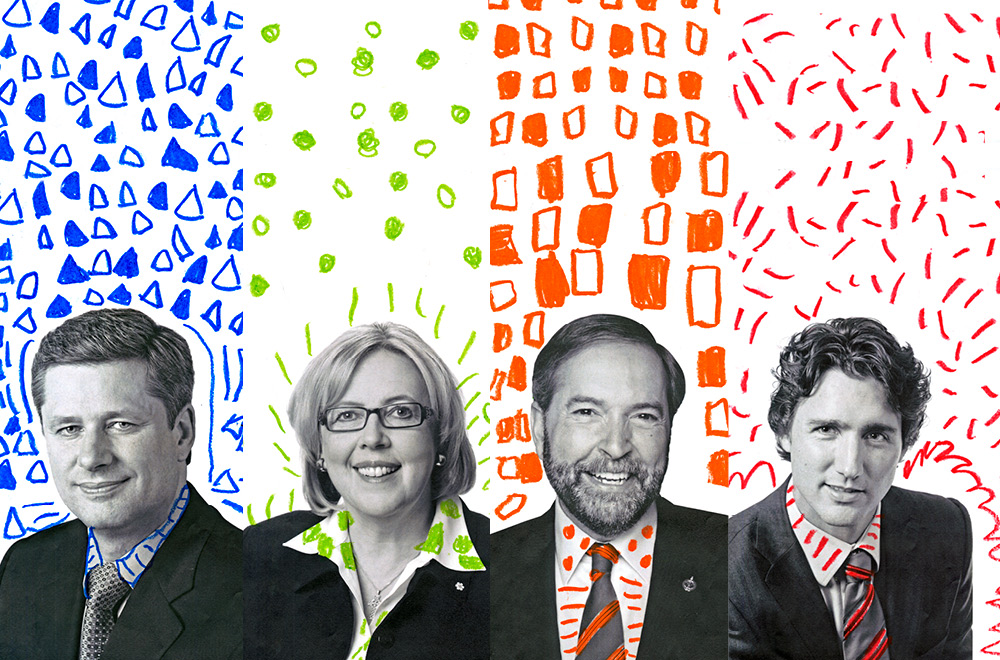
These interviews by Kathryn Hayward were originally published in Today’s Parent.
On the campaign trail, politicians are like the superhero versions of themselves. For 11 weeks, they bound tirelessly around the country, eager to enthusiastically shake as many hands and utter as many clever sound bites as humanly possible. But what are they really like in the off-hours—at home, without the cameras? At Today’s Parent, we’re intently interested in the challenges of raising children and, in a way (metaphorically, at least), the prime minister is the head of the Canadian family. So we asked the leaders of the four major parties what they’re like as parents—and they were all eager to talk about their kids, their struggles and triumphs as parents, and how they plan to help Canadian families. Read on for an eye-opening perspective on each of the candidates.
Click the name below to jump to that leader’s profile:
Stephen Harper
Thomas Mulcair
Justin Trudeau
Elizabeth May
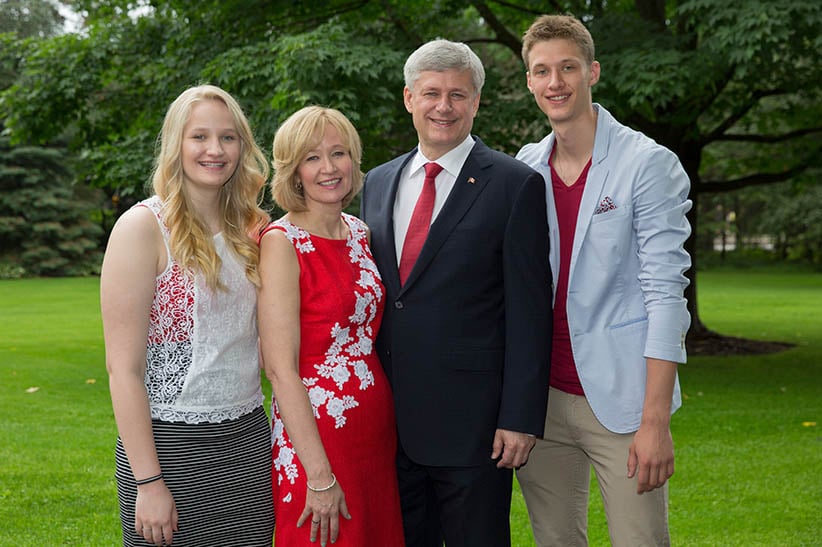
STEPHEN HARPER, Leader of the Conservative Party
AGE: 56
FAMILY STATUS: He and his wife, Laureen, celebrated their 21st wedding anniversary last December. He is dad to Ben, 18, and Rachel, 16.
GO-TO BEDTIME STORY WHEN THE KIDS WERE LITTLE: “With Ben, we read the whole Harry Potter series. With my daughter, we read the Magic Tree House books. If your children are just starting to be interested in reading or being read to, you actually can’t get better books than that.”
WHAT HE’D DO IF RE-ELECTED AS PRIME MINISTER: “There are a whole bunch of things that we would do. We’re living in an age of unprecedented economic instability. It’s been going on for seven years now and, through that, we’ve been doing everything we can to protect Canadian jobs and grow the Canadian economy. The most important priority for people is growing our economy and creating jobs. There are specific things we’re doing for parents and families. Over the summer, we made the Universal Child Care Benefit bigger—it now goes up to age 17. We’re providing additional funds for institutional child care expenses, and we’re providing income splitting for parents with children. We’ve also announced enhancements to Registered Education Savings Plans to match grants for lower-income parents. So look, we’re doing everything we can to make life more affordable and create more opportunities—especially for parents with children.”
HIS PARENTING PHILOSOPHY: “I don’t think that Laureen and I ever sat down and really discussed a philosophy. I’m certainly more the disciplinarian than my wife—Laureen is not at all a disciplinarian. But generally our approach has been a little bit different than how I was raised. There is a framework with some rules, but we try to let it go within that, so long as the kids are doing something, to let them find their own passions, their own individuality. I’m sure we’ve done a million things wrong—as all parents do.”
WHAT IT’S LIKE RAISING KIDS AT 24 SUSSEX DRIVE: “When I got back into public life, Ben was only five or six years old and Rachel was three. And so we’re in a situation that’s very different than other people’s. How do we provide them with a normal family life, community life, neighbourhood, friends and school? To be honest, I think one of the best things we did was to keep our kids in public school. I’m a believer in the public school system, and I think that especially for our children—given how they could often be living in a very cloistered environment—attending the public school system and meeting a range of kids from different backgrounds have been a positive thing. We’ve tried to give them as much as we can in the extraordinarily unusual circumstances of being children of the Prime Minister. We try to give them a life that, in terms of activities and relationships, would be very similar to other children because someday we’ll be back in private life and they’ll be making their own way in the world.”
GETTING QUALITY TIME: “The truth is, particularly given my job once I got back into public life, Laureen has carried the lion’s share of the child-raising. What I always try to do is make sure that, whether it’s the weekend or evenings, we set a time where I spend time with the children and try to focus on the things that they’re interested in. As all parents know, you hit an age—usually around Grade 7 or 8—where they don’t necessarily want to spend that time with you, so you have to pick your openings.”
THE BEHAVIOUR HE ENCOURAGES: “To me, the most important thing is respect for other people. I always say to the kids, ‘You don’t have to like everyone, you don’t have to be friends with everyone, but you don’t pick on people. You don’t single people out because they’re different. And if that goes on, you call it—you stand up against it. It’s not how we conduct our lives. You don’t build yourself up by belittling others.’ Our kids, I think, have got that message.”
THE IMPORTANCE OF BEING FAIR: “I tell my kids, particularly my son, who likes to compete and to win: ‘You’ve got to be fair. You don’t win by cheating; you win fair. Respect rules, be honest, apply yourself when you’re in an activity. Make a decision later, and don’t quit in the middle.’ ”
THE LEARNING GOES BOTH WAYS: “My son is now in university, so it’s a totally different relationship with him now. My relationship with my son is with another adult. And actually, to be frank about it, he’s actually a good source of advice. I think he’s wise beyond his years. Or maybe I’m not as wise as I think, because he seems smarter than me on some of these things. He’s a high-performance athlete—he is on the university volleyball team and he has really developed in that role. In a political race like this, he understands the psychology of going through the ups and downs.”
ADVICE FOR WOULD-BE PARENTS: “Those phases go so quickly—the rolling phase, the toddler phase and so on. It all just goes too quickly, and you don’t want to miss any of it.”
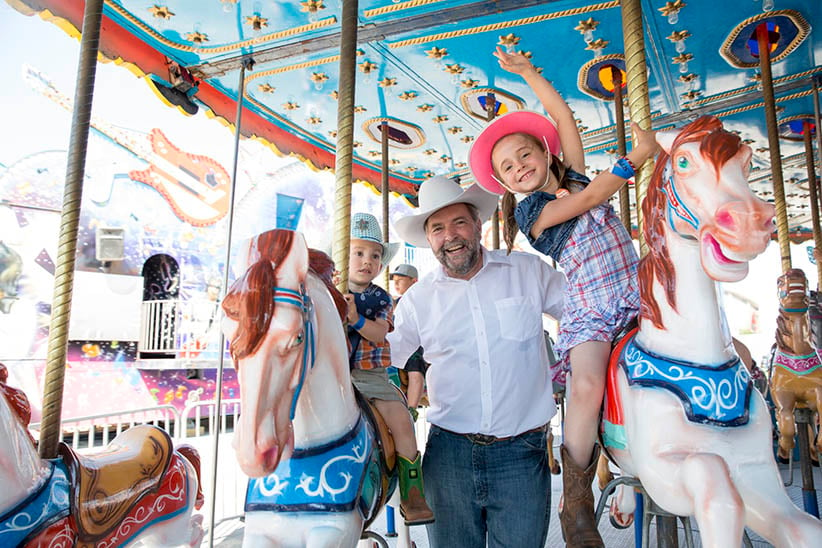
THOMAS MULCAIR, Leader of the New Democratic Party (NDP)
AGE: 60
FAMILY STATUS: He has been married to Catherine P. Mulcair for 39 years. He is dad to Matthew, 37, and Gregory, 33, and grandfather to Juliette, 6, and Raphael, 2.
GO-TO BEDTIME STORY WHEN THE BOYS WERE LITTLE: “We had a whole series of Disney books, and those were absolutely their favourites.”
WHAT HE’D DO FOR PARENTS AS PRIME MINISTER: “Well, the NDP have a clear plan to get $15 daycare, and that’s resonating very well across the country. That’s what Catherine and I had to do. In Quebec City, Matt was in a family daycare situation from the beginning and that wasn’t really satisfactory. There wasn’t really much going on—it was just babysitting. And then we got him into this great co-op daycare and it was fabulous. We realized that boost in getting early education. We know as parents what it was like to find those spaces for our kids. And I hear stories from parents all across the country about not being able to find quality affordable child care. That’s why it’s such a top priority for the NDP in this campaign.”
HIS PARENTING PHILOSOPHY: “We were extremely present in our kids’ lives. I don’t mean nattering, but in the sense that we did activities together. So, for instance, I was the coach of Greg’s hockey team for a number of years. Catherine and I would take them to swim meets and school events. We didn’t send them off to activities so much as we accompanied them to activities. Even though Catherine comes from a European background and a culture that doesn’t have a heck of a lot of hockey, she became the quintessential Canadian hockey mom and I would say that was the starting point of being very present in our kids’ lives and working constantly to make sure that we were there with them.”
PITCHING IN ON THE HOMEFRONT: “I come from a family of 10 kids and I’m the second-oldest, so I grew up with a lot of responsibility. When I was eight, I could change diapers, and I’m not talking about things with tape on them. These were diapers with pins and you had to learn how to not stab yourself or your kid sister or brother. And my parents relied on us—they knew we could help. Because of the fact that we came from such a large family, my dad gave me the model of how to be. My dad was always in the kitchen. And he was a really good cook and he always had us clean up. That was the model that my brothers and I have tended to follow. I would dare say—Catherine could confirm this—we both had an even role in raising our kids, and we shared all tasks equally.”
SHOWING THE WAY: “Both Catherine and I were very active in the community. Catherine volunteered at the school. I was on the board for the Oral School for the Deaf and on the board of the St. Patrick’s Society and other charities in Montreal before I started in politics. I’d say that volunteering is a Canadian value shared by Catherine and myself, and both our kids have continued along in their own vein. Matthew, our older son, is a police sergeant and has been volunteering for years for the board of directors for a sports co-op in the Laurentians, where he lives. And Greg, who is a physics professor, volunteers at Ste. Anne’s Hospital. This is just a reflection of good values—I think we modelled it.”
HIS APPROACH TO DISCIPLINE: “My parents made a deal with us and they stuck to it religiously. They said, ‘If you’ve done something and something has gone wrong and you come and tell us, then you’re never going to get into trouble. We won’t fix it; we’ll figure it out. But you’ll never get in trouble if I hear it from you. If I hear it from somebody else, then that will be a problem.’ That was a system of trust that my parents worked on with us. And like I say, they had a lot of kids to work with. Catherine and I did the same thing with our kids. There was an openness, and they knew they could always talk to us.”
THE PERKS OF BEING A GRANDFATHER: “It is more relaxing being a grandparent because you don’t have that responsibility. We sometimes tease our kids if their kids are fussing: ‘Matt, haven’t I told you? The way to do this is to give them everything they want.’ ‘Oh, yeah, that’s how you raised us,’ he’ll say. You can just love them and hug them and spoil them but also be present with them. We make it a priority, despite the fact that we are in the middle of a campaign. In fact, last weekend, it meant going to a chips stand, having hot dogs and playing mini-golf with them for a couple of hours. But that was the time we could have to swing up north to where they live to be with them and then swing back down. It’s a priority, like everything else in life. You make your priorities, and for Catherine and myself, the priority was to be very present in our kids’ lives.”
THE BEST MEMORIES: “Being in the stands, watching Greg play football. I coached him when he was younger, but Matt, Catherine and I loved to watch the games together. As well, we have incredible memories of the times we were together in Europe. We always made family time a priority. Catherine’s family took a little bit more work because half her family was overseas, but I would say that those were the best times spent together.”
THE SECRET TO A LONG AND HAPPY MARRIAGE: “I’ve been blessed to have an incredible partner. Catherine is just extraordinary. And part of [a successful marriage], I would dare say, comes from Catherine because she’s so good at it that I’ve learned from her. It’s not just the couple; it’s the relationship that has to have a separate existence—it needs to be taken care of and cherished. It’s something that we make sure to take care of, making sure we make time for each other and that the actual relationship is healthy and gets lots of sunshine.”
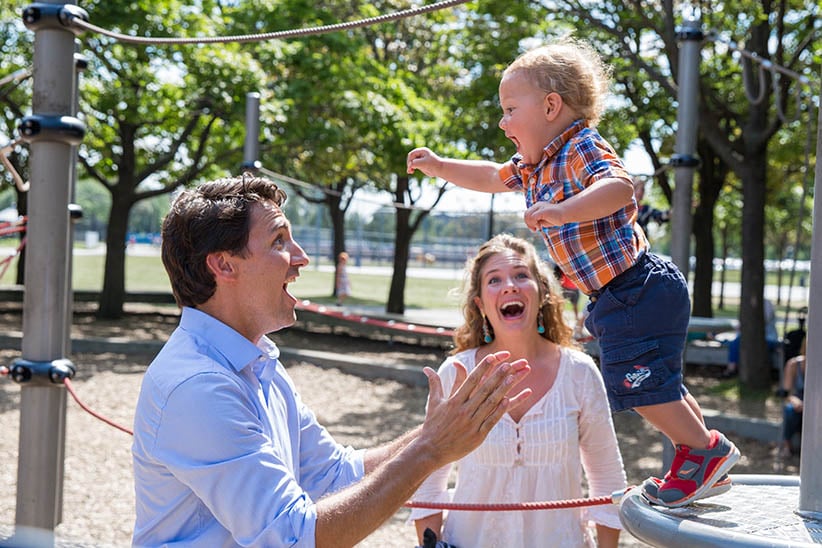
JUSTIN TRUDEAU, Leader of the Liberal Party
AGE: 43
FAMILY STATUS: He has been married to Sophie Grégoire for 10 years. They have three kids: Xavier, 7, Ella-Grace, 6, and Hadrien, 18 months.
GO-TO BEDTIME STORY FOR HIS KIDS: “I introduced them to Where the Wild Things Are probably way too early because it was one of my favourite books.”
WHAT HE’D DO FOR PARENTS AS PRIME MINISTER: “Whether it was my parents or as a parent myself, we always want to give our kids the best opportunities. In the past, hard-working parents led us to be more successful with every generation. Right now, a lot of people are worried that might no longer be true. There’s a lot of worry and anxiety. I use this lens for my decisions. What’s going to benefit them in the long run? A number of people I have spoken to have concerns about having to make impossible choices like “Should I pay for my kids’ education or save for my own retirement?” They are worried that, quite frankly, everything seems to be getting more expensive and they don’t seem to be getting ahead. Confident, optimistic countries are always willing to invest in their future. Creating the public transit, social infrastructure and green infrastructure we need in the coming years is just a smart investment in Canadians and in our own future. That’s exactly what I am going to do.”
HIS PARENTING PHILOSOPHY, PART ONE: “The first thing I think of is unconditional love. The love part is easy; the unconditional can be challenging. So the kids know that even when they make a mistake, we aren’t going to love them less. That’s all part of growing and learning, and nothing they can do will make us stop loving them. It’s something that I received from my parents. Whenever I messed up, I got in trouble, but I never felt that my parents loved me any less. For me, the unconditional element to loving them is really, really important.”
HIS PARENTING PHILOSOPHY, PART TWO: “The second part is instilling a sense of responsibility—them accepting consequences and responsibility for their choices and for their actions. Think about what they are doing, the impact it may have on their siblings, on their family and on their friends. It’s about really developing that sense of the impact of one’s choices on the world that they are part of.”
HIS PARENTING PHILOSOPHY, PART THREE: “And I guess the third one would be about independence and having confidence in themselves. Just this morning, it was the first day of school for my two older kids: Xavier is in Grade 3 and Ella-Grace is in Grade 2. Now we saw them to the bus stop and saw them get on the bus and we said, ‘Now should we drive down to the school and meet you? Be there for when you get off the bus, so you can find your class?’ And they said, ‘No, no, we’re okay. We’re fine. Love you.’ To have secure six- and seven-year-olds—that feels pretty good that they’re confident enough about their abilities and their strengths.”
AN EARLY WAY TO FOSTER RESPONSIBILITY: “They have chores that they often end up doing but sometimes skip, just like any kid—chores like making the beds, bringing their plates back into the kitchen or helping to make breakfast. Xav helped make breakfast yesterday morning and part of that involved clean-up. He made bacon and sausages. He was mostly in charge of frying the sausages. He loves to cook, and that’s something we encourage.”
ON NURTURING CONFIDENCE: “A lot of it has to do with physical confidence. We go for hikes in the woods regularly as a family. And we get them to challenge themselves and climb this tree or that rock, or we challenge them to jump across this gap or push themselves on what has already been a long walk.”
PITCHING IN ON THE HOMEFRONT: “When I’m around, I put them to bed. That’s the big special treat: They get to fall asleep in the master bedroom—Mommy and Daddy’s bed. Because I’m home one or two nights a week these days, especially on the campaign, I’m trying to do as much of it as I possibly can. Facetime has been good because the kids don’t like to necessarily talk on the phone, but when they can see me, that makes a big difference.”
ON WORK/LIFE BALANCE: “One of the things I get most often in politics from people is, ‘You know, Justin, thank you for this doing this. I know how difficult it is for you to be away from your family, but I know you are doing this job in spite of the fact that you have a young family.’ And I always have to catch people and take them back and say, ‘No, no, no, the only way that this job makes any sense is if I’m doing this because I have a young family.’ Because that thought of what I’m doing to make sure that the world they’re going to grow up in is going to be better, going to be fairer, going to have more opportunities for them and all their neighbours is the frame that makes sense to me.”
THE BEHAVIOUR HE NIPS IN THE BUD: “Whining. I have discussions about this with Sophie. You know, no matter how annoying they get, you can’t give in. That gives them more of a licence to be annoying because they know it’s going to eventually work and they can wear you down quicker than you can resist it. So we try to stick to consequences once they are laid out, and I try to make sure that Sophie and I are being consistent in how we approach things and how we respond to things. They can’t say, ‘Well, Mom said’ or ‘Dad said.’ In general, we are pretty good.”
THE MOMENTS HE SAVOURS: “When one of them is falling asleep on me. Whether it’s on a long drive or on a plane or even one of those all-too-rare moments where I can convince them to take a nap on a Saturday afternoon. Xav is seven going on 14 now and he’s such a big boy in so many different ways, but when he falls asleep on me, he’s a two-year-old back in my arms. I miss that as intensely as any parent does. In those moments, I feel like the happiest and luckiest dad in the world.”
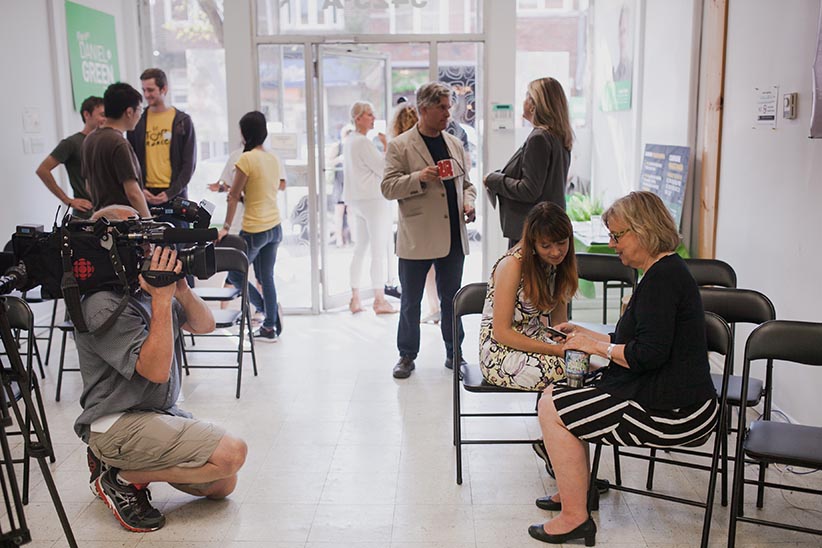
ELIZABETH MAY, Leader of the Green Party.
AGE: 61
FAMILY STATUS: Mother to Cate May Burton, 24.
GO-TO BEDTIME STORY WHEN HER DAUGHTER WAS LITTLE: “Of course, Love You Forever by Robert Munsch. But Goodnight Moon was a favourite when she was really teeny.”
WHAT SHE’D DO FOR PARENTS AS PRIME MINISTER: “As a parent, now that I’m 61, my early baby days are well behind me, but I’m always thinking about how to make life better for Canadian families. We have to help families in this country have time together. It’s a big-picture question. It has to do with the length of the work week, it has to do with economic insecurity, it has to do with affordable housing, it has to do with access to education. And the idea of time poverty—never having enough time to finish all the things you need to do. If you are stressed and preoccupied, it’s really hard to listen to your children. I go by the adage that it takes a village to raise a child, and we really need to think about how important our children are to us as a society. Our economic preoccupations overshadow what we need to do as a society to place a whole system and network of policy changes that ensure that our children start life with confidence and compassion and empathy.”
HER PARENTING PHILOSOPHY: “I was the executive director of the Sierra Club of Canada when my daughter was born, and the organization had me on contract, which meant I couldn’t qualify for maternity leave. I went back to work when my daughter was 14 days old, so my parenting philosophy was, ‘Have baby, will travel.’ I was with my daughter in a close and bonding way for the first three years of her life. We didn’t spend a night apart until she was three years old. I would take my daughter with me to meetings. We travelled, and I would find babysitters in other countries. It really worked extremely well. And it meant that I never had to go through that sudden wrenching decision of, ‘Okay, now I’m going back to work and I can’t be with my baby all the time anymore.’ Everybody is different and everyone makes their own choices, but I am very grateful.”
HER PARENTING STYLE: “I didn’t know I had one until I met Jane Goodall. I had my baby with me and we were talking about how I was raising my daughter and she said, ‘Oh, you’re a chimp mom. You’re raising your daughter just the way a chimp would. Good for you.’ So apparently my parenting philosophy was to be a chimp mom.”
ON BEING A MOTHER: “I realized I won the baby jackpot from the moment she opened her eyes. How does being a leader of a federal party and an MP compare to being a mom? Nothing in this world could ever replace how blessed I feel to be a mom.”
HARDEST THING ABOUT BEING A SINGLE PARENT: “It’s always stressful financially, but she was such an easy baby. While it would have been nice to have a partner through all of life, I have to say that [being a single mom] creates a different kind of closeness. I worry that sometimes I put too much of a burden on my daughter, given how much I depend on her. I’m so lucky that she’s there and as committed to the same causes as I am. I would never have decided to run for leader of the Green Party if she hadn’t thought it was a good idea.”
ON HAVING CATE WITH HER ON THE CAMPAIGN TRAIL: “Eleven whole weeks with my daughter? It’s such a big treat. She is totally honest. If she thinks I could have said something better or explained a point better, she will tell me. If she thinks I said something particularly well, she’ll say ‘Boy, that was really good; you should say that again.’ If I’m putting on a jacket that doesn’t go with my dress, she’ll be the one to say, ‘Mom, no.’ She’s just very supportive, helping and caring.”
HOW TO RAISE A GOOD KID: “My approach with little kids has always been to respect their intelligence. And so if I had to go to a meeting, which meant I wasn’t going to be home with my daughter, I didn’t say ‘I’m busy, you stay here.’ I took time and care to explain. At one point, when she was in grade school, I was feeling bad about being away. She said, ‘You know, Mommy, the thing is, I don’t resent it because I know you’d rather be here with me. But what you are doing is important.’ It’s impossible to explain how that happened. I could do the same child-rearing with a different child and there’d be a completely different result. I’m not saying I had any kind of special gift as a parent. The gift I got is the way my daughter is.
ON DISCIPLINE: “I still regret it to this day that I spanked her. It was on her birthday. A friend of mine had gone to a great deal of trouble and made her a cake in the shape of Barney. And I said, ‘Be sure to thank her for that, sweetheart.” She was in a bit of a mood and said, ‘Nope. Nope.’ And I said, ‘But you have to. If you don’t thank her, I’m going to spank you.’ It was a terrible thing to say. It was an ultimatum: It meant if she didn’t do it, then I’d have to spank her on her birthday. But I don’t know whether it was the right thing to do or a bad thing. You never really know, but she never again failed to thank somebody for something nice they did. I never saw that smirk on her face again after that. It grieved me terribly and I never spanked her again.”
MOMENTS SHE SAVOURS: “We’ve always liked reading aloud to each other. As she was growing up, we both became Harry Potter fans. We’d get really excited when a new book was coming out and we’d queue up to be the first ones to get it. By the time the last ones were coming out, she’d be reading them to me. She’s an extremely good writer and a very good editor, so when I write blogs, I’ll pass them over to her. We collaborate very well.”